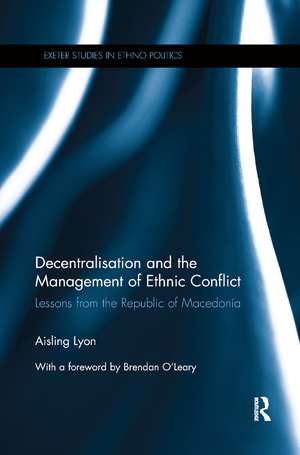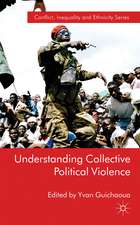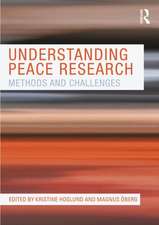Decentralisation and the Management of Ethnic Conflict: Lessons from the Republic of Macedonia: Exeter Studies in Ethno Politics
Autor Aisling Lyonen Limba Engleză Paperback – 12 dec 2019
Decentralisation and the Management of Ethnic Conflict offers new insight into the dynamics of conflict management through decentralisation, using an in-depth case study of decentralisation in the Republic of Macedonia between 2005 and 2012. Guided by the concept of horizontal inequalities, the volume identifies the factors which influenced the decision to devolve responsibilities to the municipalities after 2001.Taking an integrative approach to studying the political, administrative, and fiscal dimensions of decentralisation and its implementation, the book investigates whether these institutional reforms have indeed contributed to the reduction of inequalities between Macedonia’s ethnic groups, and what the obstacles were in those areas in which decentralisation has not reached its full potential. The key lesson of the Macedonian case is that attempts to solve internal self-determination conflicts through decentralisation will fail if local self-governance exists only in form but not in substance.
This book contributes to a more nuanced understanding of the challenges facing different forms of decentralisation in the long term, and as such represents a significant contribution to Conflict Studies, Development Studies and Political Science more generally.
| Toate formatele și edițiile | Preț | Express |
|---|---|---|
| Paperback (1) | 251.32 lei 6-8 săpt. | |
| Taylor & Francis – 12 dec 2019 | 251.32 lei 6-8 săpt. | |
| Hardback (1) | 702.31 lei 6-8 săpt. | |
| Taylor & Francis – 5 noi 2015 | 702.31 lei 6-8 săpt. |
Preț: 251.32 lei
Nou
Puncte Express: 377
Preț estimativ în valută:
48.10€ • 50.03$ • 40.31£
48.10€ • 50.03$ • 40.31£
Carte tipărită la comandă
Livrare economică 14-28 martie
Preluare comenzi: 021 569.72.76
Specificații
ISBN-13: 9780367874377
ISBN-10: 0367874377
Pagini: 270
Dimensiuni: 156 x 234 x 14 mm
Greutate: 0.45 kg
Ediția:1
Editura: Taylor & Francis
Colecția Routledge
Seria Exeter Studies in Ethno Politics
Locul publicării:Oxford, United Kingdom
ISBN-10: 0367874377
Pagini: 270
Dimensiuni: 156 x 234 x 14 mm
Greutate: 0.45 kg
Ediția:1
Editura: Taylor & Francis
Colecția Routledge
Seria Exeter Studies in Ethno Politics
Locul publicării:Oxford, United Kingdom
Public țintă
Postgraduate and UndergraduateCuprins
Introduction 1 How decentralization came to the New Macedonia 2 Has Decentralization Enhanced Local Democracy? 3 Making Local Services More Responsive to Diverse Needs 4 Who has the Money? Fiscal Reform and Local Autonomy 5 Subsidiarity Versus State Cohesion Conclusion
Recenzii
Aisling Lyon's tour de force critically engages with the assumption that a redistribution of state responsibilities enhances democracy and social harmony. Her vital contribution to debates about decentralisation sets the experiments in the former Yugoslav Republic of Macedonia within the wider context of global trends of fragmentation. Does decentralisation help to pacify societies, leave them to fend for themselves or merely grant them cosmetic authority? This is a book to be savoured as much for its compass as its attention to detail.
Michael Pugh, Emeritus Professor, University of Bradford, UK & Visiting Professor, Radboud University Nijmegen, Netherlands
Exploring the dynamics and impact of decentralisation on inter-ethnic relations in post-Yugoslav Macedonia, Lyon engages thoroughly with existing theories of conflict management, territorial state construction, and decentralisation and offers a wealth of original empirical analysis. This exceptionally timely contribution to our existing knowledge and understanding provides highly relevant policy recommendations and should be required reading for all serious students and analysts of ethnic conflict in the Western Balkans and beyond.
Stefan Wolff, Professor of International Security, University of Birmingham, UK
This important study not only contributes to our understanding of contemporary Macedonia, but also makes an important argument about the importance of decentralisation as a tool of conflict management. Macedonia is the prime case study of international mediators seeking to address interethnic relations through decentralisation and local-level power-sharing. Aisling Lyon provides a very well-researched, nuanced assessment of whether decentralisation has delivered. The weaknesses of the Macedonian experience provide useful guidance for policy makers in addressing interethnic conflict elsewhere.
Florian Bieber, Professor of South East European studies, University of Graz, Austria
Aisling Lyon's tour de force critically engages with the assumption that a redistribution of state responsibilities enhances democracy and social harmony. Her vital contribution to debates about decentralisation sets the experiments in the former Yugoslav Republic of Macedonia within the wider context of global trends of fragmentation. Does decentralisation help to pacify societies, leave them to fend for themselves or merely grant them cosmetic authority? This is a book to be savoured as much for its compass as its attention to detail.
Michael Pugh, Emeritus Professor, University of Bradford, UK & Visiting Professor, Radboud University Nijmegen, Netherlands
Exploring the dynamics and impact of decentralisation on inter-ethnic relations in post-Yugoslav Macedonia, Lyon engages thoroughly with existing theories of conflict management, territorial state construction, and decentralisation and offers a wealth of original empirical analysis. This exceptionally timely contribution to our existing knowledge and understanding provides highly relevant policy recommendations and should be required reading for all serious students and analysts of ethnic conflict in the Western Balkans and beyond.
Stefan Wolff, Professor of International Security, University of Birmingham, UK
This important study not only contributes to our understanding of contemporary Macedonia, but also makes an important argument about the importance of decentralisation as a tool of conflict management. Macedonia is the prime case study of international mediators seeking to address interethnic relations through decentralisation and local-level power-sharing. Aisling Lyon provides a very well-researched, nuanced assessment of whether decentralisation has delivered. The weaknesses of the Macedonian experience provide useful guidance for policy makers in addressing interethnic conflict elsewhere.
Florian Bieber, Professor of South East European studies, University of Graz, Austria
"This book should serve the political elites in the Republic of Macedonia as a reality check on the progress of the implementation of decentralisation reforms. Its research findings are also relevant to practitioners working in the country, and the policy recommendations it offers provide a useful tool for future progress. It is very useful reading for students, academics, political analysts, activists and NGOs studying the process of decentralisation and the circumstances that preceded the Ohrid Framework Agreement."
Review of Social Studies (RoSS), Vol.3, No.1, 122 Spring 2016
Maja Trajkovska, independent writer and researcher, Republic of Macedonia
Michael Pugh, Emeritus Professor, University of Bradford, UK & Visiting Professor, Radboud University Nijmegen, Netherlands
Exploring the dynamics and impact of decentralisation on inter-ethnic relations in post-Yugoslav Macedonia, Lyon engages thoroughly with existing theories of conflict management, territorial state construction, and decentralisation and offers a wealth of original empirical analysis. This exceptionally timely contribution to our existing knowledge and understanding provides highly relevant policy recommendations and should be required reading for all serious students and analysts of ethnic conflict in the Western Balkans and beyond.
Stefan Wolff, Professor of International Security, University of Birmingham, UK
This important study not only contributes to our understanding of contemporary Macedonia, but also makes an important argument about the importance of decentralisation as a tool of conflict management. Macedonia is the prime case study of international mediators seeking to address interethnic relations through decentralisation and local-level power-sharing. Aisling Lyon provides a very well-researched, nuanced assessment of whether decentralisation has delivered. The weaknesses of the Macedonian experience provide useful guidance for policy makers in addressing interethnic conflict elsewhere.
Florian Bieber, Professor of South East European studies, University of Graz, Austria
Aisling Lyon's tour de force critically engages with the assumption that a redistribution of state responsibilities enhances democracy and social harmony. Her vital contribution to debates about decentralisation sets the experiments in the former Yugoslav Republic of Macedonia within the wider context of global trends of fragmentation. Does decentralisation help to pacify societies, leave them to fend for themselves or merely grant them cosmetic authority? This is a book to be savoured as much for its compass as its attention to detail.
Michael Pugh, Emeritus Professor, University of Bradford, UK & Visiting Professor, Radboud University Nijmegen, Netherlands
Exploring the dynamics and impact of decentralisation on inter-ethnic relations in post-Yugoslav Macedonia, Lyon engages thoroughly with existing theories of conflict management, territorial state construction, and decentralisation and offers a wealth of original empirical analysis. This exceptionally timely contribution to our existing knowledge and understanding provides highly relevant policy recommendations and should be required reading for all serious students and analysts of ethnic conflict in the Western Balkans and beyond.
Stefan Wolff, Professor of International Security, University of Birmingham, UK
This important study not only contributes to our understanding of contemporary Macedonia, but also makes an important argument about the importance of decentralisation as a tool of conflict management. Macedonia is the prime case study of international mediators seeking to address interethnic relations through decentralisation and local-level power-sharing. Aisling Lyon provides a very well-researched, nuanced assessment of whether decentralisation has delivered. The weaknesses of the Macedonian experience provide useful guidance for policy makers in addressing interethnic conflict elsewhere.
Florian Bieber, Professor of South East European studies, University of Graz, Austria
"This book should serve the political elites in the Republic of Macedonia as a reality check on the progress of the implementation of decentralisation reforms. Its research findings are also relevant to practitioners working in the country, and the policy recommendations it offers provide a useful tool for future progress. It is very useful reading for students, academics, political analysts, activists and NGOs studying the process of decentralisation and the circumstances that preceded the Ohrid Framework Agreement."
Review of Social Studies (RoSS), Vol.3, No.1, 122 Spring 2016
Maja Trajkovska, independent writer and researcher, Republic of Macedonia
Descriere
Decentralisation and the Management of Ethnic Conflict offers new insight into the dynamics of conflict management through decentralisation, using an in-depth case study of decentralisation in the Republic of Macedonia between 2005 and 2012. Guided by the concept of horizontal inequalities, the volume identifies the facto




























